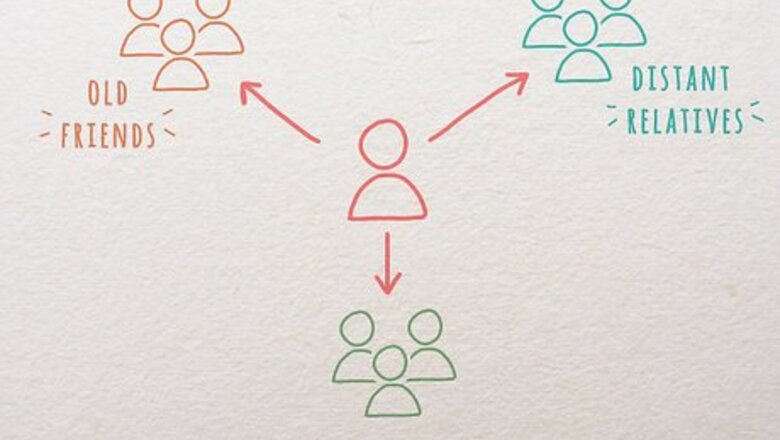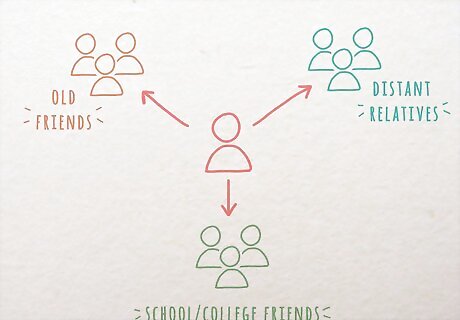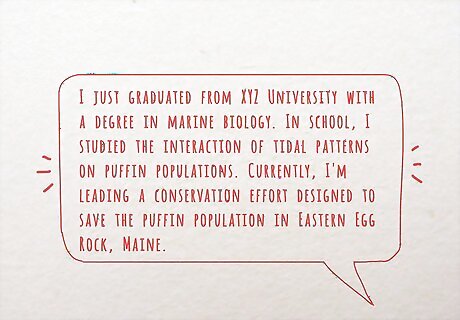
views
Get in touch with friends and relatives.

If you’re just starting out, connect professionally with your inner circle. Let them know you’re looking for work, trying to get a business venture off of the ground, or seeking new clients. Whatever it is, your friends and family will be able to help connect you to people they know and point you in the right direction. Add them on LinkedIn and any other social media you use to build your online presence as well. Reach out to old friends and coworkers online or via text. Say something like, “Hey, it’s been awhile! How are things going? I’d love to connect over Zoom or grab some coffee sometime to catch up.” By revisiting these relationships, you’ll build a strong base to start networking. Remember, the goal here is to connect with other people to offer your services and look for opportunities. By starting with people you already know, you can ask for introductions, receive recommendations, and get the inside scoop on job openings. You could also send an email like, “Hey Uncle Dave! I just finished college and I’m looking for an engineering gig. I know you work at an environmental consulting firm, so if any of your clients mention they’re looking for folks, keep me in mind.”
Jumpstart your LinkedIn connections.

Start by adding everyone you know, then move on to common connections. So, you might add an old coworker and then see they work with someone in your dream field. Add that person and send them a little note like, “Hello! I’m one of Sarah’s old co-workers and I see you’re in data analysis. I’d love to connect and ask you a few questions about your work.” By providing a little context for the connection, you’re more likely to connect with new people online. In today’s world, LinkedIn is an essential tool. If you aren’t on LinkedIn yet, make a profile and start adding the people you know! The other great upside with LinkedIn is that you can communicate and connect with people who don’t live near you. This can be a great thing if you work remotely or travel for work.
Develop your elevator pitch.

Craft a 30-second speech you can throw out to introduce yourself. This pitch should cover who you are, what you want, and how you can serve others. If you’re changing careers or looking for a new job, include a short explanation. This way, when people ask, “What do you do?” or “What brings you out?” at job fairs or meetings, you can give them a snappy, succinct answer. When you meet someone at a job fair, you might say, “Hi! My name is Elmer Wilson. I’m in marketing over at Chimney Industrial Services, but I’m looking at moving into design, which is what I’m really passionate about.” If you’re meeting a new contact over lunch, you could say, “I’m currently in advertising over at a local firm and I was hoping to pick your brain about the housing market here in Miami. I’m working on developing a new branding campaign and I understand you know this area well.”
Attend job fairs and professional events.

Look online to scout out networking opportunities in your area. If you graduated recently, ask your alma mater’s career center for a list of job fairs. Attend every event you can. Dress sharp, bring a stack of resumes or business cards, and get to mingling! Depending on the event and what you’re looking for, you can hand off resumes, chat people up about the services you offer, or just casually talk to people to get to know some new folks. Research the companies, speakers, and attendees ahead of time. This way, you can develop some talking points when you start making the rounds. If you’re just starting out, bring a friend. There’s no shame in having a trusted confidant you can bounce some ideas off of, and everyone else will just assume you know one another professionally. For example, you might approach someone and say, “Hello, I’m Franklin Nichols, I’m a recent architecture graduate. I heard your company is looking for designers and I’m a big fan of your work. What are you looking for in a candidate?”
Start collecting business cards.

Never discount anyone and hold on to every contact you make. If someone makes an effort to hand you a business card or contact sheet, it means they’re open to a professional relationship. Even if you’re in sales, you never know when you may need advice from a marketing guru, or get the inside scoop on an opening from a logistics manager. Store your business cards in a rolodex or folder and save every contact in your phone.The bigger your network is, the better! The more diverse you can get with your contacts, the better. If you don’t have a business card yourself, now is the time to make one. Your business card will often dictate someone’s first impression of you, so get them professionally printed.
Ask your peers and coworkers for introductions.

Your stronger connections can broker big meetings for you. For example, if you want to run a company one day, ask a close connection to set up a meeting with their CEO for you. If you want to get into coding, ask your engineering friend to connect you with the software team at their firm. People are more likely to meet with you if you come recommended from a trusted source, and this is a great way to network vertically to meet people higher up on the ladder than you are. You could ask them about setting up a chat over the phone for you, or just ask them for an email address to shoot them some questions. Alternatively, you could ask friends and close business contacts to recommend you for job openings or set up sales pitches.
Play it cool during informal chats.

If a contact doesn’t seem interested in talking business, don’t push. Just keep the conversation going and treat it like a normal chat. A lot of people prefer some small talk before they start chatting about business. That’s okay. You’re more likely to build a meaningful connection if you meet them on their terms. Forget the business jargon, sales pitches, or resumes. Just connect with them through your informal conversation. You can always build on that rapport in the future. You’re more likely to find a meaningful network connection if you invest 15 minutes to talk casually, as opposed to throwing your elevator pitch out and asking for a business card before walking away.
Ask a lot of open-ended questions.

If you find it kind of hard to connect with someone, questions are your best friend. Once the conversation reaches a standstill, throw out a question like, “So how has business been for you recently?” or, “How did you get into financial consulting?” This will give the other person an opportunity to speak about themselves and guide the conversation. People respond well when other people seem interested in them, and asking questions is a great way to demonstrate that you’re invested and genuine. This also gives you an opportunity to look for things you may have in common with someone. If the conversation isn’t focused on work just yet, feel free to ask, “So how was your holiday?” or, “How are you enjoying the event so far?”
Find common ground and lean into it.

People tend to gravitate towards people they share something with. When you’re networking, look for those little connections. If they mention a sports team you enjoy, guide the conversation to spend a few minutes talking about playoffs and draft picks. If you went to the same university, chat it up about your shared experiences. Everything from places you’ve travelled to the suit that you’re wearing can be used to build a connection. This takes the chore out of networking and makes it more fun. Treat networking events like an opportunity to meet new people. If you start looking for authentic connections instead of hunting for people who can help you, you’re going to be more successful.
Offer and volunteer your services.

The more you give, the more you’ll receive in the future. Throw it out there that you’re always willing to proofread business proposals or take a look at a project budget to see if it makes sense. Alternatively, you can mention that your door is always open for new clients, or say that you’re willing to offer a discount on a future service. Emphasize your ability to solve problems for other people instead of asking questions about what they can do for you. Always close out conversations with something like, “Feel free to reach out in the future if you ever need anything,” or, “I’d love to sit down to see how I can help you grow your brand in the future.” This way, you part ways with the impression that you’re a resource for others.
Follow up with people you meet.

A few days after meeting someone, shoot them an e-mail or call them. Remind them how you met and throw in a genuine note about getting to know them better in the future. This will make your one-off interaction stick out in their head, and they’ll be more likely to remember you in the future. This can pay serious dividends if any opportunities pop up on their end. For example, you might say, “Hello! This is Diana, we met at the Oxford Writer’s Panel. I just wanted to say that I had a good time chatting about the current state of publishing. If you ever need anything in the future, please don’t hesitate to reach out. I’d love to connect over coffee once that busy schedule of your’s clears up!” If you made any promises or mentioned sending something their way, do it in the follow-up email. This kind of follow through can really help cement a connection, even if it’s just a link to an article you referenced when you met.
Let your network develop organically.

Go out for drinks with new coworkers and chat it up with new contacts. If you meet a new client who loves football games, ask them if they’d like to see a game together some time. If you make an effort to hang out with people, you’re naturally going to develop a solid business relationship. But if you only ever reach out to talk about job openings, they aren’t going to think of you right away the next time an opportunity pops up. Building a network takes time. Don’t push yourself on people and give every relationship room to breathe. Remember, every person you meet is not going to end up being your closest confidant, so try not to rush things.




















Comments
0 comment